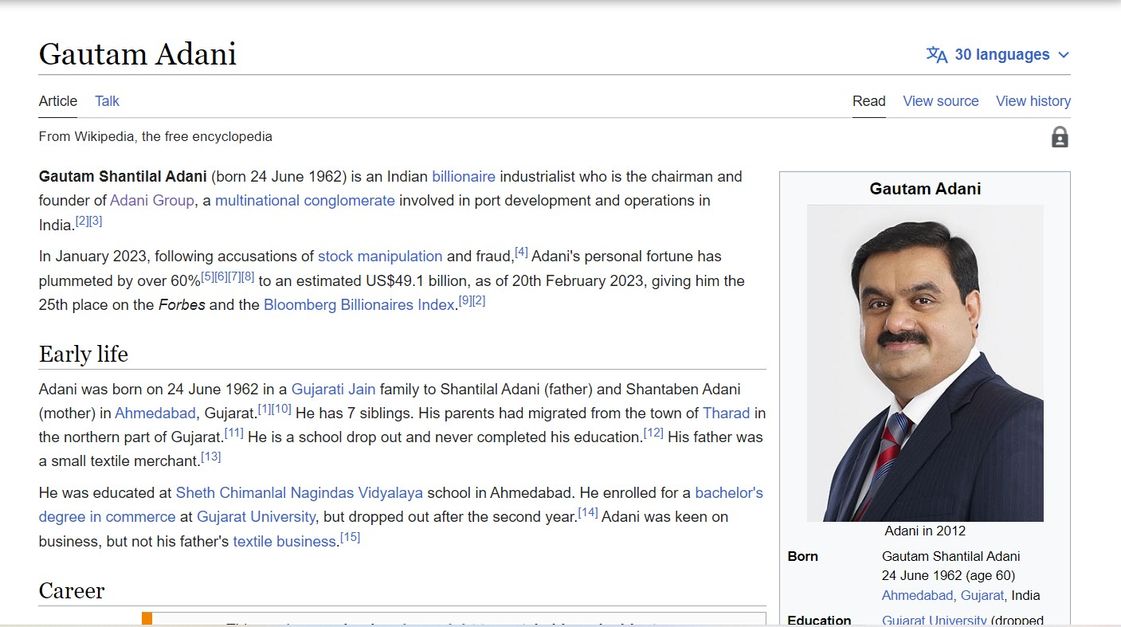Exposed: Adani Group’s Wikipedia Scandal – How Sock Puppet Accounts and Paid Editors Manipulated Information
One of India's most significant conglomerates, the Adani Group, has been charged with utilizing Wikipedia to create an inaccurate picture of the business and its operations. Concerns have been expressed concerning the integrity of the information provided on the web platform and the likelihood that other companies may do the same.

Exposed: Adani Group’s Wikipedia Scandal – How Sock Puppet Accounts and Paid Editors Manipulated Information”
HIGHLIGHTS
- The Wikipedia newspaper has reported on a scandal involving the Adani Group.
- The company used sock puppet accounts and paid editors to manipulate information in their Wikipedia entries.
- This shocking revelation raises questions about the credibility of the information presented by the company and the ethics of its marketing practices.
The Adani group has already made an unsuccessful attempt to repair the harm caused by the fraud claims made by Hindenburg, and its problems continue to worsen. The conglomerate’s market worth has already dropped by $132 billion, its stocks have been downgraded, and its global partner TotalEnergies has stopped work on a significant green hydrogen project. Adani is currently accused of faking Wikipedia content as it deals with inquiries over market fraud.
In an astonishing admission, the famed online encyclopaedia Wikipedia has charged the Adani Group with editing its entries using paid editors and sock puppet identities. The Age, an Australian publication, covered the story and offered proof of the group’s activity on the platform.
One of India’s most significant conglomerates, the Adani Group, has been charged with utilizing Wikipedia to create an inaccurate picture of the business and its operations. Concerns have been expressed concerning the integrity of the information provided on the web platform and the likelihood that other companies may do the same.

What are sock puppet accounts?
False accounts, known as “sock puppets”, are made to control conversations and convey a false sense of public opinion. These accounts are frequently used to provide false testimonials, improve the online reputation of a business, or manipulate the results of an online poll or survey.
Sock puppet accounts are said to have been used to change Wikipedia articles about the Adani Group, its founder, and its projects. According to reports, the adjustments made by these accounts were intended to present the corporation in a favourable light and minimize any drawbacks.
What are paid editors?
Paid editors are those who receive compensation for editing Wikipedia articles on behalf of a business or organization. These editors are frequently employed to enhance the company’s reputation and eliminate any inaccurate content.
According to reports, The Adani Group hired a group of paid editors to update its Wikipedia entries. According to reports, these editors changed entries that discussed the company’s influence on the environment, labour policies, and controversies. According to reports, the adjustments were made to boost the company’s reputation and bury any unfavourable material.

An article from The Signpost, Wikipedia’s independent newspaper, claimed that the Adani Group manipulated Wikipedia entries using sock puppet accounts and paid editors. Nate Anderson, the founder of the US short-seller group Hindenburg Research, tweeted the article. This marked a new development in the Adani-Hindenburg saga.
Nate Anderson, the founder of US short-seller Hindenburg Research, tweeted, “Of all things—now the Signpost, Wikipedia’s independent newspaper, is out w/ an article showing how Adani systematically manipulated its Wikipedia entries using sock puppet accounts, undisclosed paid editors & removing the evidence of conflicts of interest.”
The Signpost reported in its article that nine pieces on the Adani family and its enterprises were written or altered by over 40 later banned or prohibited sockpuppets or unidentified paid editors.
According to the Signpost article, the Adani Group article was rewritten using the company’s IP address. In contrast, many other articles were edited to add biased information and cut out “conflict-of-interest” material. “Nine related articles on the Adani family and family businesses were created or revised by 40 later banned or blocked sockpuppets or undeclared paid editors.
Many of them added or changed unfavourable information or puffery to a number of the articles. The Adani Group post was written entirely from scratch by a disclosed paid editor who used a business IP address. Others eliminated the disclaimers about editing that might be biased. Several authors used unconventional techniques to produce articles, evading Wikipedia’s quality assurance procedures, “said the article.
From bogus businesses to fake accounts
The Signpost also discovered that one such paid editor was using the company’s IP address to fill the Adani Group website with unfavourable content. Adanigrouponline and Adani Group, two identities explicitly created for editing and rewriting solely Adani-related pages, were even blacklisted by Wikipedia between 2013 and 2014.
Because of its restrictions on account names, Wikipedia had in May 2013 and September 2014 prohibited the users “Adanigrouponline” and “Adani Group.” They were single-purpose accounts (SPAs) that edited articles about Adani, including a completely rewritten version of the Adani Group article that did away with the conflict-of-interest notice at the top.
Since Wikipedia is a wiki, anyone may edit almost any page and rapidly enhance articles. Yet neutrality is the guiding concept that underpins it. An internet user who uses a false name or identity to dispute, harass, or review things under a different name is known as a “sockpuppet.”
Wikipedia has listed IP addresses that are said to have edited information about Adani, his wife Priti, son Karan, nephew Pranav, and the group firms. Some of these edits on Adani were allegedly made by company employees. An Adani Group official did not answer a request for remarks through email.
“Administrators blocked User: Adanigrouponline in May 2013 and User: Adani Group in September 2014 according to Wikipedia’s account name policies. These were single-purpose accounts (SPAs) that edited articles about Adani, including a completely revised version of the Adani Group article that did away with the conflict-of-interest notice at the top.

Also, they added a thorough list of corporate divisions and a section that paid editors love to read: an honours list. Yet, they maintained a portion that had previously been added by an unregistered user who was an admitted Adani employee. Given that Wikipedia does not claim ownership of any of its entries, the use of “our” and “we” in encyclopaedia articles is particularly problematic “, the article stated.
“The IP address belongs to Adani Enterprise Limited, according to Whois, and the unregistered user left the edit comment “(Revisited & revised all the content, Modifications by Satyam Trivedi (Corporate Communication, Adani))”. Three minutes after this update, a conflict-of-interest notice was posted to the page’s top, but Adanigrouponline quickly removed it “further noted in the article.
The document continues by listing numerous additional users who had altered information on the family and the Adani Group firms using comparable techniques.
This occurred when the Adani Group was under intense pressure due to a shocking US short-seller report published by Hindenburg Research on January 24.
Market capitalization (mcap), led by billionaire Gautam Adani, fell below $100 billion on Monday and has dropped over $135 billion since the report’s publication.
Removing conflict of interest notices
According to the study, an unregistered person edited one Wikipedia entry on Adani but left Satyam Trivedi’s contributions unaltered. Adanigrouponline later removed the conflict of interest warning that had been posted to the article’s top.
The Adani Group’s declarations and guarantees to investors have not been able to stem the stock market’s decline, which has led to the recent report by The Signpost. Hindenburg slammed the company for using nationalism as a cover for fraud, and the firm also made an effort to make the Adani stock market collapse mimic the tragedy at Jallianwala Bagh.
The repercussions of editing Wikipedia entries
Editing Wikipedia entries can have detrimental effects. Thousands of individuals rely on the web platform as a reliable source of up-to-date, unbiased information. The platform’s credibility can be harmed by manipulating its content and misleading the public.
Concerns about the Adani Group’s transparency and the integrity of the material provided have been raised due to the alteration of its Wikipedia entries. Along with drawing attention to the company’s actions, the claims have increased public pressure and examination of those policies.
Edited by Prakriti Arora




